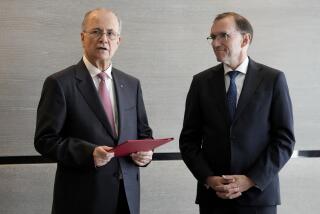EU Supports Palestinian Statehood
- Share via
JERUSALEM — To Israel’s dismay, Palestinian Authority President Yasser Arafat has won from the European Union what he could not from President Clinton in talks at the White House this week: a public endorsement of the Palestinian right to self-determination, including statehood.
The European Union declaration, which came early Friday at the conclusion of a summit in Berlin, was its clearest statement supporting the Palestinians’ goal of declaring an independent state.
European leaders urged the Palestinians to take the step through negotiations but said their right to take it is “not subject to any veto,” presumably Israel’s.
The decision comes at a critical juncture in the Middle East peace process, little more than a month before Arafat’s May 4 target date for making a statehood proclamation and seven weeks before Israeli elections for prime minister and parliament.
Arafat faces mounting international pressure to defer any declaration, at least until after the May 17 elections and possibly for as much as a year.
Western diplomats here said the European statement was designed to reward Arafat for his now-almost-certain decision to postpone an announcement, and it was met Friday with cheers from the Palestinians and scathing criticism from the government of Israeli Prime Minister Benjamin Netanyahu.
“We will not accept such dictates,” David Bar-Illan, a senior Netanyahu aide, said Friday, hours after the statement was released. “What this decision does is render the negotiations of final status useless and peripheral, transforming them from discussions of substance to discussions of means--a route to a foregone conclusion.”
Netanyahu himself, in statements made even before the document was released and again Friday morning, attacked the decision as a threat to Israel’s existence, invoking the emotion-laden memory of the Holocaust to castigate the Europeans.
“Europe should not have done this,” Netanyahu told reporters Friday. “The Jewish people experienced the worst trauma of its history in Europe, so Europe should show greater sensitivity and not suggest solutions to the Middle East conflict that jeopardize the Jewish people and the Jewish state.”
Netanyahu argued that a Palestinian state would be able to “field a large army, form alliances with regimes sworn to Israel’s destruction and serve as a base for increased terrorist activity” that would endanger Israel’s existence.
Some Israeli politicians criticized Netanyahu’s reference to the Holocaust--the Nazi genocide in which 6 million Jews died during World War II--while expressing their own concern over the European decision.
Yossi Sarid, the leader of the leftist Meretz Party, said Netanyahu should not try to gain “political capital” from the Jewish people’s greatest tragedy.
Yet he and others here, including the opposition Labor Party, called the European Union decision a troubling interference in the negotiations with the Palestinians, even as they said Netanyahu’s handling of the peace process was to blame because it prompted the international community’s demonstration of support for Arafat.
“Netanyahu himself, in fact, is building a Palestinian state,” said a statement issued by the One Israel movement, a newly formed coalition led by the Labor Party.
In the EU declaration, the European leadership “reaffirmed the continuing and unqualified Palestinian right to self-determination, including the option of a state, [and] looks forward to the early fulfillment of this right.”
The Europeans also suggested a one-year deadline for concluding final-status negotiations, which were to have been completed by May 4 under the Oslo peace agreement but in reality have barely begun.
In contrast, Arafat came away from a White House meeting with Clinton this week with strong U.S. expressions of support for the peace process and accelerated final-status talks--but a reiteration of the American position against a unilateral statehood declaration.
Several commentators and political analysts here said they believed that the U.S. and European actions were part of a “package deal” aimed at helping Arafat put off his declaration.
A U.S. diplomat here confirmed that there have been contacts between the two sides on the issue but said the European statement had gone well beyond the recent discussions.
Palestinian officials, meanwhile, hailed the announcement from Berlin, calling it a positive development for the peace process.
“This is a realistic approach to peace and a recognition that the Palestinian right to self-determination should not be linked to the negotiations with Israel,” chief Palestinian negotiator Saeb Erekat said Friday. “No nation on Earth declares its independence after asking someone else.”
He and others stopped short of endorsing the European call for an extension of the May 4 deadline, saying they believe that the suggested 12-month postponement is too long.
Erekat said the European and U.S. statements will be presented to a late April meeting of top Palestinian officials, who will make the final decision on whether to delay the declaration.
More to Read
Sign up for Essential California
The most important California stories and recommendations in your inbox every morning.
You may occasionally receive promotional content from the Los Angeles Times.













